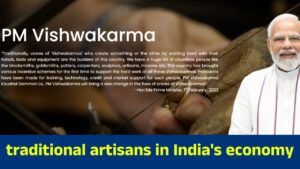traditional artisans in India’s economy
- Overview of the scheme, its purpose, and vision.
- Historical context: the significance of traditional artisans in India’s economy.
- Launch details: Date, inaugurated by PM Modi, and the target demographic.

Key Objectives
- Bridging traditional skills with modern technology.
- Promoting self-reliance among artisans.
- Enhancing livelihood opportunities through financial support and market access.
Comprehensive Features
- Skill Development Programs:
- Details of the basic and advanced training modules.
- Importance of these modules in modernizing traditional craftsmanship.
- Examples of trades benefiting from training (e.g., pottery, goldsmithing).
- Toolkits and Financial Incentives:
- Description of the ₹15,000 e-voucher scheme for purchasing tools.
- Stories of artisans upgrading their tools for better productivity.
- Loan Provisions:
- Collateral-free loans of ₹1 lakh and ₹2 lakh at subsidized rates.
- Real-life testimonials from beneficiaries who expanded their businesses.
- Digital Empowerment and Market Support:
- Significance of digital transactions and incentives.
- Success stories of artisans leveraging e-commerce for better sales.
Eligibility and Registration
- Detailed explanation of eligibility criteria.
- Step-by-step guide for registration via Common Service Centers (CSCs).
- Discussion on the verification process and its importance in ensuring transparency.
Impact Analysis
Related Posts
- Economic Upliftment:
- Contribution to rural and urban artisan families.
- Statistical data on income growth post-implementation.
- Social Transformation:
- Empowerment of women in traditional trades.
- Examples of how the scheme has rejuvenated fading art forms.
- Cultural Preservation:
- Reviving traditional crafts and their integration into modern markets.
- Role in promoting “Make in India” and “Vocal for Local.”
Challenges and Criticism
- Barriers faced by artisans in accessing the scheme.
- Suggestions for improvement, such as wider outreach and simplification of the application process.
Success Stories
- Case studies of artisans who transformed their lives through the scheme.
- Highlighting diverse trades like tailoring, blacksmithing, and toy-making.
Government Support and Monitoring
- Budget allocation and fund disbursement details.
- Mechanisms in place for tracking the scheme’s progress.
Future Outlook
- Plans for expanding the scope of the scheme.
- Long-term vision for achieving sustainable livelihoods.
